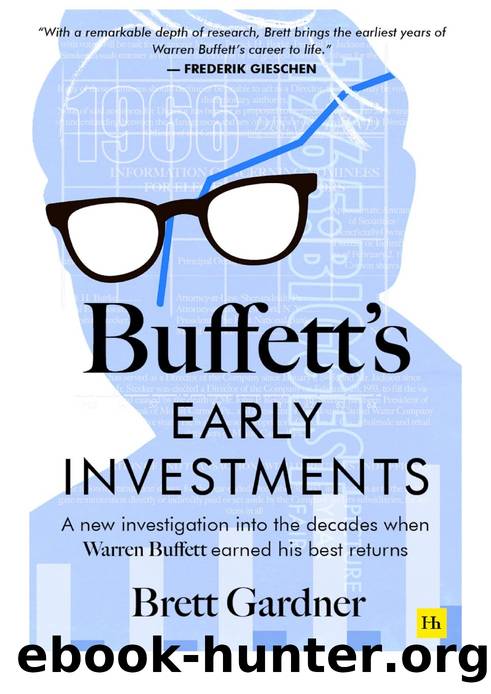Buffett's Early Investments: A New Investigation Into the Decades When Warren Buffett Earned His Best Returns by Brett Gardner

Author:Brett Gardner [Gardner, Brett]
Language: eng
Format: epub
Tags: Business & Economics, Personal Finance, Investing
ISBN: 9781804090589
Google: 98YsEQAAQBAJ
Publisher: Harriman House Limited
Published: 2024-11-04T23:00:00+00:00
Moreover, Buffett proceeded to write a remarkable letter to Clark in which he rather breezily absolved Amex management of any responsibility for the scandal, encouraged it to use shareholder money (which included Buffettâs) to pay creditors harmed by the scandal, and more or less encouraged Clark to forget the whole thing. Finally, and most importantly, Buffett continued adding to his American Express position long after the scandal had diminished in importance. By the time he sold his position years later, American Express had become the most important individual contributor to the results of the Buffett Partnership and arguably the biggest turning point in Buffettâs career.
To see how this all came about, we have to go back more than a century.
Cash is the curse of the traveling class
In 1836, the U.S. federal government dissolved the Second Bank of the United States, ending the only national interbank messenger system. This created a problem for privately owned banks: Then, as now, they constantly transacted business with other banks, but unlike today, these transactions required cash and securities to physically travel from one bank to another. Without the government-sponsored interbank messenger system, banks would now have to handle these types of transactions themselvesâa difficult, dangerous, and expensive proposition for any one bank to take on alone.
Special courier services called express companies emerged to solve this problem. Banks would hire the express companies, whose employees would accompany the shipments to ensure the banksâ cash, securities, or gold arrived safely at their destination. Over time, express companies increased their business by combining bank shipments with other items requiring rapid delivery, such as packages, perishables, and fragile items. The added volume brought added efficiency, which was shared with customers, allowing the major express companies to drop the discount rate on deliveries (essentially the expressâs commission percentage) from 10% to around 1%. Because express companies charged for financial instruments by value and packages by weight, banks remained their most valuable customers.
Demand for these services grew as the population dispersed. Railroads became the critical infrastructure connecting the country. Express companies used the railroads to transport their goods, with the railroads charging either a flat monthly fee or a percentage of the gross receipts. Many leaned towards the gross-receipt formula since it aligned incentives between the two, with the railroads benefiting when the express business grew. Further, the contracts required the express companies to keep their rates above bulk-freight rates so they wouldnât directly compete with railroads. Expresses fought for exclusivity over the rail lines, which became a feature of nearly all express contracts by the 1870s.232
The American Express Company was formed in 1850 when William Fargo, Henry Wells, and John Butterfield merged their three separate express companies into one. The combination ended fierce competition between Wells and Butterfield and set the newly formed enterprise up to dominate the New York express business.233
When the trio merged, they structured the company as an unincorporated joint-stock association with a lifetime of only ten years. Unlike a limited liability corporation, this meant that
Download
This site does not store any files on its server. We only index and link to content provided by other sites. Please contact the content providers to delete copyright contents if any and email us, we'll remove relevant links or contents immediately.
| Analysis & Strategy | Bonds |
| Commodities | Derivatives |
| Futures | Introduction |
| Mutual Funds | Online Trading |
| Options | Portfolio Management |
| Real Estate | Stocks |
Rich Dad Poor Dad by Robert T. Kiyosaki(6612)
Pioneering Portfolio Management by David F. Swensen(6289)
How To Win Friends and Influence People by Dale Carnegie(4504)
The Money Culture by Michael Lewis(4198)
The Dhandho Investor by Mohnish Pabrai(3760)
The Wisdom of Finance by Mihir Desai(3735)
Liar's Poker by Michael Lewis(3441)
Fooled by Randomness: The Hidden Role of Chance in Life and in the Markets by Nassim Nicholas Taleb(3108)
The ONE Thing by Gary Keller(3066)
The Intelligent Investor by Benjamin Graham Jason Zweig(3036)
Mastering Bitcoin: Programming the Open Blockchain by Andreas M. Antonopoulos(3035)
The Psychology of Money by Morgan Housel(2986)
Rich Dad Poor Dad: What The Rich Teach Their Kids About Money - That The Poor And Middle Class Do Not! by Robert T. Kiyosaki(2953)
Investing For Dummies by Eric Tyson(2948)
How to Day Trade for a Living: Tools, Tactics, Money Management, Discipline and Trading Psychology by Andrew Aziz(2944)
How to Win Friends and Influence People by Dale Carnegie(2912)
Market Wizards by Jack D. Schwager(2697)
How to Pay Zero Taxes, 2018 by Jeff A. Schnepper(2646)
Zero Hour by Harry S. Dent Jr. & Andrew Pancholi(2645)
